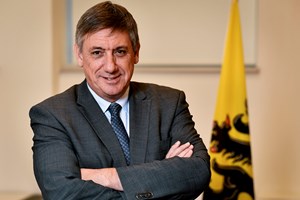
Dirk Vanduffel of ArtDependence had a conversation with Flemish Minister President and Minister of Culture, Jan Jambon, on how he navigates the Flemish cultural landscape through the ongoing pandemic period.
In a recent interview with the Flemish Minister President and Minister of Culture Jan Jambon, Dirk of ArtDependence discusses with the Minister on how he navigated the Flemish cultural landscape through this Covid period, actions he took, things that changed, policies he created and how he sees the future. It is clear that culture in the broadest sense will play a crucial (pivotal) role in Flanders’ recovery.
Dirk Vanduffel: How do you see the role of culture in the Post-Covid Era?
Jan Jambon: Today, Covid has gripped society for more than a year. The crisis shows us how much culture is needed, for our development as individuals and also as a socially binding agent. In culture we meet, we learn new things, we are moved or touched, we recognize ourselves-or just not quite. Culture challenges us to think who we are and why we do what we do. I would like to emphasize that I am talking about culture in its broadest forms - arts, heritage, social cultural work, music and so on. It is all these aspects that keep our society together and make it a warm Flemish home.
All cultural organizations have been strongly affected by the Covid crisis, although the impact varies from organization to organization. Physical public activities came to a standstill for a while and then only gradually and incompletely, they resumed. Artistic performances, exhibitions, public activities, the educational offers, but also many services and volunteers are still feeling the consequences of this now. The crisis also accelerated the digital field due to the great need for a digital experience.
The crisis obviously has a financial impact on the cultural sector, especially for cultural organizations that generate a lot of money from public activities. The impact is even greater for vulnerable groups active in the sector such as freelancers and people without a permanent contract including technicians, exhibition builders, restorers, guides and so on.
I made a lot of resources available to deal with these consequences. In 2020 I launched the Emergency Culture Fund with a budget of €65 million. As part of the recovery policy I foresee 100 million Euros being made available for investing in cultural infrastructure, €10 million for strengthening the Flemish Audio-visual Fund, €10 million for the development of a digital association counter, €5 million for digitalizing art and heritage collections and €2 million for the further development of heritage databases. Finally, all cultural organizations and core players could also subscribe to the cultural activities premium, which is providing €35 million to support them in restarting their activities.
Fortunately, light is gradually shining at the end of the tunnel, although the truth is that we will carry the consequences with us for a long time. We have to take this into account in the plans we make and in the assessment of the files presented. We have to be realistic, but also ambitious. After all, culture plays a crucial role in our recovery after Covid.
Covid has also accelerated a trend that had long been present in society and in the cultural sector. We have rapidly embarked on the digital path and it will radically change our world. Not only how we interact with each other and `how our society will be shaped, but it will also have a major impact on the cultural world. Just think about the new ways we will interact with our audience, or how innovative productions/products will be made. The cultural sector will not and should not miss this boat. It is the role of the sector to embrace this as well as to deal with it critically. There are also opportunities here to appeal to other audiences and to explore new, alternative revenue models. This fact will also strengthen cross-sector collaborations. Think of the collaborations between artists and AI, or between heritage, art and social life.
Post-Covid, culture will also act as a driving force for international travel, culture is thus an important engine for economic recovery.
You clearly attach importance to international cultural cooperation, can you give some examples?
First of all, I would like more structural coordination with the cultural sector about their needs in developing an international operation. After all, International cooperation and exchange has a strengthening and inspiring effect for all organizations, both at a shorter distance (for example in the border region, other autonomous regions, e.g. Quebec, Hauts-de France) and within Europe or across Continents.
At the same time, I want to involve the cultural sector more closely in the international initiatives of the Flemish Government. There is a strong interaction between the international activities of cultural organizations and the international cultural policy of the Flemish Government. By putting more focus on the priority countries and regions, as well as on the objectives and instruments, I created a clear framework for my international actions. For example, during foreign missions and through cultural trade missions, I focus on strengthening existing relationships with leading institutions. In this context, cultural policy and cultural diplomacy link up seamlessly and the strengthening of Flanders’ international reputation goes hand in hand with strengthening the international operation of the cultural sector.
I also want to bring leading international networks and professionals to Flanders more often, so that the broad professional field can network internationally and put the richness and diversity of the Flemish arts and heritage field and its own expertise in the spotlight. In this way we can attract international experts and makers, and show that international projects also deserve a place in Flanders.
My Culture, Foreign Affairs and Flanders Investment & Trade administrations are working with VISIT FLANDERS to develop a cooperation framework to strengthen mutual coordination in foreign initiatives as well. The Flemish representatives abroad play an important role in supporting and, where appropriate, facilitating connections and networking. I foresee financial contributions for, among other things, foreign presentations. After all they contribute to Flanders international image. The permanent attraction of European funds for cultural projects in Flanders is also useful and necessary, because we often establish long-term partnerships with foreign partners. I also want to use the Creative Europe Desk with purpose.
I will also urge the federal government to work on the federal law of transposition for the 1970 UNESCO Convention on the restitution of cultural goods. After all, proper application of this convention requires a federal implementation law. With regard to the problem of Jewish looted art, I want to continue to consult with the other competent authorities and check with them to what extent further initiatives are desirable in this area.
Reaching an international audience is also high on my agenda. Covid has virtually halted international cultural tourism , but it is only a matter of time before international visitors find their way back to our cultural heritage. Our cultural heritage is an attraction that Event Flanders also capitalizes on, exploring the partnership between Culture, Tourism and Sports for international events. Our international image is important and we welcome international visitors with great pleasure. However, maximizing the number of visitors should not be the only goal: there must be a balance between the carrying capacity of the heritage and the environment, and the sustainability of the public reach. My colleague, responsible for Tourism, and I, as Minister of Culture, agree on this need for sustainability in public reach.
The UK is currently making an effort to ban the export of works of art that have national importance. Do you have any such plans?
In Flanders, this goal is pursued by the Masterpieces Decree. The decree stipulates that cultural object that were included in the Top Pieces List, as well as cultural objects that were not placed on this list but meet the criteria of being “rare and indispensable “, may not be taken outside Flanders without prior authorization. If this permission is refused, the Flemish government are obliged to purchase the cultural object at the “international market price” if the owner so wishes. If the government does not wish to proceed with the purchase, they must grant authorization.
Recently, we were able to purchase Paul Van Ostaijen’s iconic manuscript “Occupied City” through Flanders’ Top Pieces Fund for our literary heritage. Earlier we were able to purchase the work Greta American Nude no . 45 by Tom Wesselman. With this purchase we acquired a relevant work from the Matthys-Colle collection and helped to facilitate the collaboration that the Matthys-Colle Foundation and SMAK
(Stedelijk Museum voor Actuele Kunst, Ghent) set up for this important private collection. I want to continue the active purchasing policy that we are now pursuing in this area in the future, both towards Contemporary Art and Top Pieces. To this end , I will continue to focus on a powerful Masterpieces Fund and purchase policy for Contemporary Art. We can feel proud of our Top Pieces. During this policy period, I am planning a Top Pieces exhibition at an important heritage location in Flanders, in which 100 Flemish (known and unknown) Top Pieces will be given a place in the spotlight. In this way we can draw the attention of the general and international public to the richness and diversity of the “heritage of exceptional importance” that is still preserved in Flanders.
What are you looking forward to during this term of office?
After the Covid pandemic, I want to be able to fully enjoy the rich offerings of Flemish culture again, although I must add that I am satisfied with our decision to keep the doors of the museums open throughout the Covid period. In order to put our Flemish Masters on the map, I will ensure that the KMSKA (Royal Museum of Fine Arts Antwerp) can reopen the doors of the renewed museum after years of closure and a thorough renovation. As Minister of Culture, I am particularly looking forward to that historic moment. A new MuHKA (Museum of Contemporary Art Antwerp) is also planned. I am carefully following the necessary infrastructural and institutional steps for adequate functioning of the future museums. I have invested in both museums because both their architecture and collections are an important part of our broader culture-tourism story.
On my list of priorities at the start of my term of office was the realization of an indemnity scheme. A major and long-known challenge to encourage major and institutional loans is the introduction of an indemnity scheme that can reduce insurance costs for international exhibitions.
The Museum of Flanders should also become a highlight. It will become the prime example of the Flemish innovative ability in the field of arts and heritage. Flanking the need for digital transformation, I emphasize that for the future Museum of Flanders, we are resolutely drawing the map of digital innovation. The new virtual museum will be an innovative facilitator of the existing heritage institutions in Flanders. Most museums show only a fraction of their heritage collections as their exhibition space is limited. Some objects are also too large or too fragile to be on display. Thanks to modern technology, objects hidden in storage can still be displayed. This also applies to the often fragile documentary heritage in our archival institutions and heritage libraries.

ArtDependence Magazine is an international magazine covering all spheres of contemporary art, as well as modern and classical art.
ArtDependence features the latest art news, highlighting interviews with today’s most influential artists, galleries, curators, collectors, fair directors and individuals at the axis of the arts.
The magazine also covers series of articles and reviews on critical art events, new publications and other foremost happenings in the art world.
If you would like to submit events or editorial content to ArtDependence Magazine, please feel free to reach the magazine via the contact page.